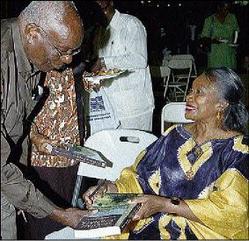Mel Cooke, Freelance Writer

Professor Maureen Warner-Lewis hands a copy of her book to Reverend Ashley Smith after signing it following the launch, held at UWI Press, Gibralter Road, Mona, on Friday, February 15. - Winston Sill/Freelance Photographer
When University of the West Indies Professor Emerita Maureen Warner-Lewis spoke near the end of the launch of her latest book, Archibald Monteath, Igbo, Jamaican, Moravian, the importance of the family bond was underscored.
She told those gathered outside the new University of the West Indies Press home on the Mona campus that Archibald Monteath, Igbo, Jamaican, Moravian came out of a text her husband introduced in the 1970s, "before he was a professor".
It was the story of Archibald Monteath, a slave who bought his freedom in 1837 and died in 1864.
It was thought that there could have been a family connection, through Rupert Lewis, and Warner-Lewis said "my initial aim was to prove this link". However, after doing a genealogy search, the closest she came to a connection was working on the same estate in St Elizabeth, a picture of which is on the front of the new book.
"I had to decide," Warner-Lewis said of reaching that sticking point in her research. She choose to "follow the lead of Dr John Aarons" in expanding on an existing text. So Archibald Monteath, Igbo, Jamaican, Moravian, which occupied her since 1992, and took her to Eastern Nigeria, Australia, Scotland and across Jamaica "is the result of Aarons' embryonic work".
Guest speaker Professor Patrick Bryan of the Department of History at Mona traced the life of a man who was renamed Toby and then Archibald Monteath as told by Warner-Lewis. Among the chapters is one on African spirituality and two on the planter Monteath family, from whom the slaves got their surname.
Bryan outlined five stages in Monteath's life, born sometime after 1789. As he approached his teenage years, the only son of his parents was tricked and sold into slavery. The second stage of "betrayal", Bryan said, was being transported across the sea, then there was enslavement on the plantation. The fourth stage was conversion to Christianity and the fifth and final his decision to purchase his freedom in 1837, one year ahead of Emancipation.
Monteath, described as "a tall, sturdy man with black skin and thick, wooly hair", did not participate in the 1831 Sam Sharpe rebellion. There were chuckles when Bryan pointed out that Sharpe took the path of resistance and died on the gallows, while Monteath chose accommodation, progressed financially (he successfully cultivated 15 acres of land) and died peacefully in his bed.
"We all choose," Bryan said, adding that when we realise that there are really no stark choices we will realise that both Sharpe and Monteath, "in his own way and facing his own options, did the right thing".
And Warner-Lewis also pointed out that Monteath was not a rebel nor a Maroon.
Buying freedom
"His method was to excel in the tasks he was given to do, save his money and buy his freedom. That was the legal option open to him."
Dr Mawuena Logan of the Department of Literatures in English described Archibald Monteath, Igbo, Jamaican, Moravian as a "tour de force", clarifying the Monteath story was first told to a pastor in 1853 and published in 1864, the year he died.
"The narrative was silent on the practical horror of plantation life," Logan said, as it concentrated on the spiritual aspect of the tale. Warner-Lewis, through research, has written "to fill in the gaps and moments of silence in Archibald's narrative".
And Mrs Linda Speth, general manager of the University of the West Indies Press, told the gathering that based on orders already in, it was expected that Archibald Monteath, Igbo, Jamaican, Moravian will be reprinted in the near future.

